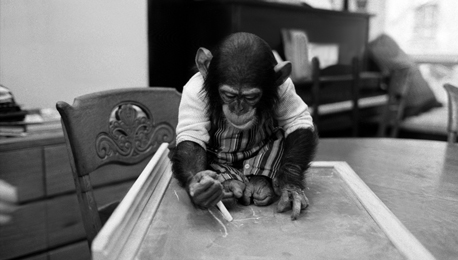Project Nim
12AWithin the first five minutes of this film you'd be forgiven for thinking that you had walked into the wrong screening and were watching Rise of the Planet of the Apes instead. It's the seventies, and Professor Herb Terrace tears a newborn chimp away from its mother in the name of science. Herb wants to explore the mind of the chimp, whom he names Nim Chimpsky (a play on words with Noam Chomsky, famed linguist and scholar) and tries to discover if it was really possible to communicate with the ape. Having done so, Nim then goes on to destroy mankind, and apekind takes over the world.
It all sounds like the stuff of science fiction, but all of it is true Ė well, maybe except for the bit about the destruction of mankind, that was probably Rise of the Planet of the Apes, come to think of it.
Unfortunately for Nim, this experiment involved him being treated almost like a foster child, being moved from place to place over the years. And although he was staying in the homes of those Terrace thought would help with collating his data, the truth is that Nim was raised in his formative years as some weird cross between a pet and a baby, even to the point where one of his carers would breast feed him.
Nim did indeed learn to communicate most effectively with humans using sign language, but due to matters outside his control, his destiny was never in his own hands. And despite his obvious protests, he was time and again let down by those who supposedly cared for him.

What's this piece of shit? I asked for an iPad, dammit!
British director James Marsh, whose Man on Wire won the best documentary Oscar in 2009, has clearly sifted through hours and hours of archive photos and film footage to bring Nim's story to the screen.
One of the biggest surprises is that so many of those involved with Nim at the time were prepared to speak on camera, considering how many of them treated him so poorly. Actually it's no surprise that Terrace shows up, as he is depicted throughout as a savvy media whore who would normally only turn up to see Nim if a camera crew were in tow.
As the film progresses, it becomes clear that it's less about the remarkable achievement of one ape and more about the incredibly selfish nature of mankind. Because it was the seventies it appears that it was deemed OK to give Nim alcohol and dope; that would be all well and good if he was kidnapped by some off-their-heads hippies and taken on a wild adventure, but these are the actions of so-called respected academics, some of whom had children of their own.
Throughout the film, itís clear that those involved in these experiments didnít consider Nimís wellbeing to be an issue. When Terrace wasn't posing for pictures, he was hiring pretty young things almost under a false pretence to get involved in the project, just to satisfy his own sordid desires.
So other than Nim there's no-one else to really root for. There is one trainer named Bob, who appears to do more than most to look out for Nim's best interests, but ultimately his involvement isn't quite enough.
There's no denying that many involved loved Nim, but they did really terrible work of caring for him.
And although Marsh does a thorough job at collating all the archive material, the film almost feels like only half the story; the end of the film flashes up 'ten years later', informing the audience of Nim's outcome. Considering that Nim was 26 years old at that point, that seems like a huge chunk of the chimp's life left untouched.
What Marsh achieves in one sense is a shallow victory; he holds up a mirror on society to show us something that we already know, that mankind is only interested in looking out for number one.
As far as Nim's plight is concerned it's remarkably touching. It's just a shame that his story had to be told in the first place.
